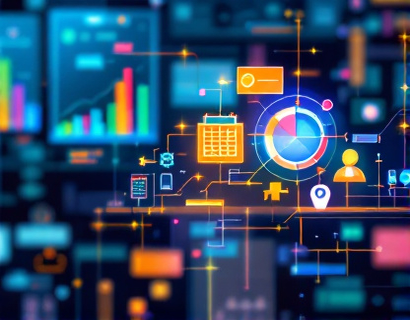AI-Powered Mental Health Navigator: Transforming Access to Psychiatric Services and Industry Knowledge
The integration of artificial intelligence in mental health services has ushered in a new era of accessibility and personalized support. An AI-powered chatbot designed to deliver specialized insights into psychiatric services and the mental health industry represents a significant advancement in this field. This technology ensures that users of all ages, from children and students to educators and healthcare professionals, can engage with mental health topics in a confident and responsible manner. The chatbot's primary function is to provide accurate, up-to-date, and safe information, fostering a deeper understanding and more informed engagement with mental health issues.
Ensuring Content Accuracy and Safety
The development of such an AI chatbot places a strong emphasis on content verification to maintain the highest standards of accuracy and safety. This is particularly crucial when dealing with sensitive topics like mental health, where misinformation can have serious consequences. The chatbot is designed to cross-reference information with reputable sources, ensuring that the data provided is reliable and current. For users who may be particularly vulnerable, such as children and students, the chatbot includes a child-verified mode, filtering content to be age-appropriate and safe.
Tailored Information for Diverse Audiences
The chatbot is equipped to cater to a wide range of users, each with their unique needs and levels of understanding. For children and students, the language used is simplified and concepts are explained in an engaging and easy-to-understand manner. This approach not only educates but also helps demystify mental health topics, reducing stigma and encouraging open discussions. For educators, the chatbot provides resources and insights that can be integrated into curricula, offering practical tools for teaching mental health awareness. Healthcare professionals benefit from detailed, professional-level information, including the latest research and treatment protocols.
Specialized Insights into Psychiatric Services
One of the key features of the AI chatbot is its ability to provide specialized insights into psychiatric services. Users can ask about various aspects of mental health care, such as types of therapy, medication options, and the roles of different mental health professionals. The chatbot can explain complex concepts like cognitive-behavioral therapy (CBT) or pharmacotherapy in layman's terms, making it accessible to everyone. It can also guide users through the process of finding the right psychiatrist or therapist, considering factors like specialization, location, and insurance coverage.
Understanding Mental Health Professionals
The chatbot offers detailed profiles of different mental health professionals, including psychiatrists, psychologists, social workers, and counselors. Users can learn about the educational background, areas of expertise, and typical treatment approaches of each professional. This information helps users make informed decisions about their mental health care and understand the collaborative nature of mental health treatment teams. For instance, the chatbot can explain how a psychiatrist might work alongside a psychologist to provide comprehensive care.
Industry Knowledge and Trends
Beyond individual services, the chatbot provides valuable insights into the broader mental health industry. Users can stay updated on the latest trends, research findings, and policy changes affecting mental health care. This includes discussions on mental health legislation, insurance coverage for mental health services, and the impact of technology on mental health treatment. For students and mental health enthusiasts, the chatbot can serve as a resource for research papers and articles, pointing them to credible sources and recent studies.
Interactive and Engaging Experience
The chatbot is designed to be interactive and user-friendly, encouraging active engagement from users. Through a conversational interface, users can ask questions, express concerns, and receive immediate, tailored responses. The chatbot uses natural language processing to understand and respond to a wide range of queries, making the interaction feel more like a conversation with a knowledgeable mentor. This approach not only enhances user experience but also builds trust and confidence in the information provided.
Supporting Mental Health Education
In the educational sector, the chatbot can play a pivotal role in promoting mental health awareness and education. Teachers and educators can use the chatbot to incorporate mental health topics into their lessons, providing students with accurate and age-appropriate information. The chatbot can offer lesson plans, activity ideas, and discussion prompts that align with educational standards and objectives. By integrating mental health education into the curriculum, schools can help students develop essential life skills and a better understanding of mental health issues.
Building a Supportive Community
Another significant aspect of the AI chatbot is its ability to foster a supportive community around mental health. Users can connect with others who share similar experiences or concerns, creating a safe space for sharing and support. The chatbot can facilitate these connections by providing forums or groups where users can anonymously share their stories and receive support from peers. This community aspect is particularly beneficial for individuals who may feel isolated or hesitant to seek help from traditional sources.
Resource Directory
The chatbot includes a comprehensive resource directory that users can access for additional support and information. This directory lists local mental health services, hotlines, and online resources, categorized by region and type of service. Users can easily find resources tailored to their specific needs, whether it's crisis intervention, long-term therapy, or support groups. The chatbot can also provide instructions on how to access these services, including steps for contacting providers and understanding insurance coverage.
Continuous Learning and Improvement
The AI chatbot is not a static tool but a dynamic system that continuously learns and improves. Feedback from users is regularly incorporated to refine the chatbot's responses and enhance its capabilities. This ongoing improvement ensures that the chatbot remains a reliable and valuable resource over time. Additionally, the chatbot stays updated with the latest research and developments in the mental health field, ensuring that the information provided is always current and relevant.
Ethical Considerations and Professional Guidance
While the chatbot provides valuable information, it is essential to emphasize that it is not a substitute for professional mental health care. The chatbot clearly communicates its limitations and encourages users to seek help from qualified professionals when needed. It provides guidance on when to consult a psychiatrist or therapist and offers tips on how to approach these conversations. By promoting responsible engagement with mental health topics, the chatbot helps users make informed decisions about their care.
Conclusion
The AI-powered mental health navigator represents a significant step forward in making mental health services and knowledge more accessible and understandable to a diverse audience. By providing accurate, safe, and tailored information, the chatbot empowers users to take control of their mental health journey. Whether for educational purposes, personal support, or professional guidance, this technology has the potential to make a meaningful impact on mental health care and awareness. As the field continues to evolve, such tools will play an increasingly important role in breaking down barriers and fostering a healthier, more informed society.











































